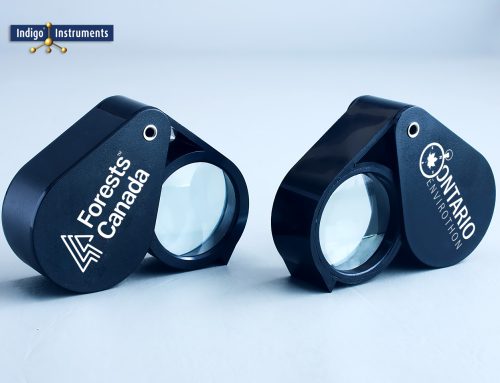What is Macular Degeneration?
Macular degeneration is the death of retinal cells responsible for fine detail and color. It is perceived as a black spot in the middle of your visual field, a sort of reverse tunnel vision. As the condition worsens, you lose your ability to read or recognize faces.
There is no cure for this affliction at present. In its early stages, you can compensate with magnifiers that are stronger than simple handheld round readers.
Just looking for magnifiers? See: Macular degeneration pocket magnifiers.
What is the Macula?
The retina is a thin layer of cells at the back of your eye that reacts to light and provides information for your brain to interpret. It consists of two types of cells, rods and cones. Cone cells allow you to see detail and color and are located in the macula. The smaller central region of the macula is the fovea which has the greatest density of these cells and is essential for reading.

The macula sees light coming in through the pupil in a direct line & interprets detail & color. The much larger area outside the macula has rod cells which are used to detect motion and see in dim light. Image courtesy of the VMR Institute, Huntington Beach, CA.
Reading With Macular Degeneration
Reading with macular degeneration requires a workaround to make the letters in a word bigger than the black spot in the center of your field of view. You can see an example of this in the image below. We show the entire word “apparatus” but in reality, once the text is magnified, you may only have room in your field of view for the letter “A”.
The image is somewhat exaggerated but the concept here is that with a bit of practice, you can infer the letter from just the top, bottom and sides that you can make out. Reading this way will of course be painstakingly slow.

What you see with macular degeneration with an unaided eye at the top and with an appropriate magnifier at the bottom.
The Best Macular Degeneration Magnifier
There is no “best magnifying glass”; that really depends on the severity of your condition. The two magnifiers below will enlarge letters which should be enough for earlier stages. The smaller magnifier has three 30mm (1.25″) that can be stacked to achieve 10 and 15 times magnification. The larger magnifier has 50mm ( 2″) lenses with 10X magnification. Both should work but you may find a preference for one over the other.
Neither of these has a built in light but sunlight or a lamp should be enough. Both magnifiers are small and portable enough to fit pockets or purses.

These two magnifiers can magnify from 5 to 15 times and should allow you to read newspapers and books, slowly, unless your condition is advanced.
What if 5-15X Isn’t Enough?
We do offer stronger geology type loupes that go as high as 20 times but we recommend these only as a last resort as they are much more difficult to use.
Please note that we recommend these magnifiers not as medical professionals but simply as a solution to an optical problem. We recommend you consult your ophthalmologist or optometrist first.
Late Addition to Blog
Fluorescence micrograph, 40X of monkey retina.

Primate foveola (central region of the retina). Image courtesy of Hanen Khabou, Vision Institute, Department of Therapeutics, Paris, France. 6th Place. 2018 Photomicrography Competition.
Human retina, 40X using Immunocytochemistry and Confocal Microscopy.

Human reinta. Image courtesy Nicolas Cuenca & Isabel Ortuno-Lizaran. University of Alicante, Department of Physiology, Genetics and Microbiology San Vicente del Raspeig, Alicante, Spain. 20th Place 2018 Photomicrography Competition
References
- What is the macula? Basic information from the VMR Institute
- Macular degeneration facts and figures. Stats from around the world.




